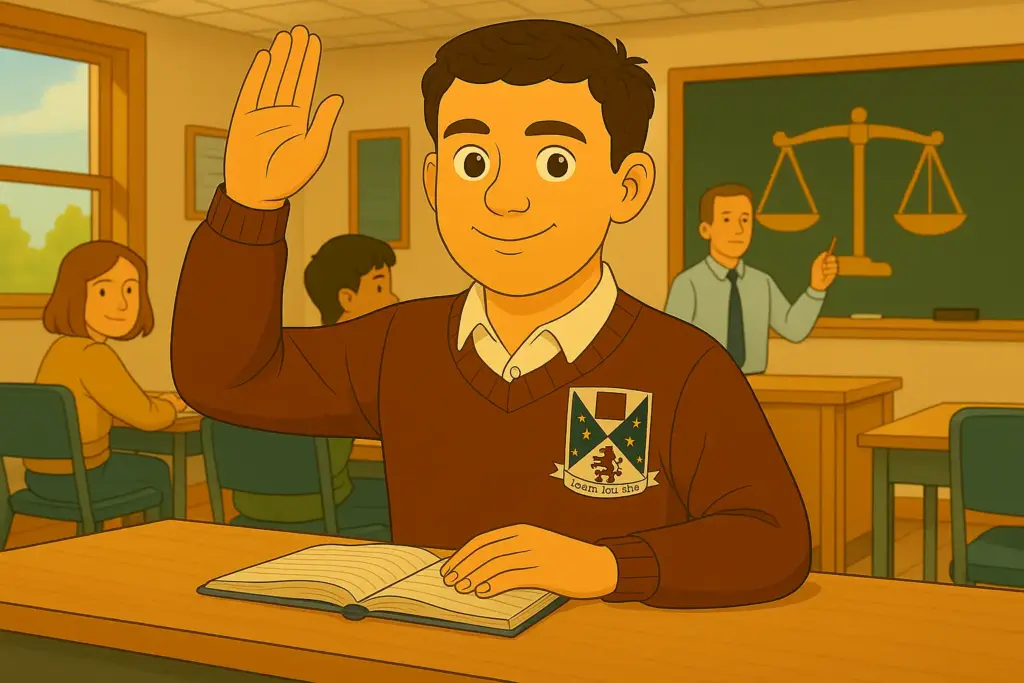Your Rights at School
What you can and can’t do as a student

What you can and can’t do as a student
Your Rights at School
Schools are not just places where knowledge is passed on; they are also environments where students are entitled to specific legal protections. These rights are designed to make sure every learner has a fair chance to succeed, regardless of background, abilities, or beliefs. The law generally recognizes that students keep many of their personal rights inside the classroom, even though schools have some authority to set rules and maintain order.
One of the most important guarantees is the right to education. This means students should have equal access to teachers, materials, safe classrooms, and learning resources like libraries and technology. Schools must take steps to prevent discrimination based on factors like gender, disability, religion, or ethnicity. For students with special needs, this often includes providing reasonable accommodations so they can fully take part in lessons and activities.
These protections go beyond simply being in the classroom. Students are usually allowed to take part in discussions, join school activities, and have a say in matters that affect them — as long as their actions do not disrupt learning or infringe on the rights of others. While schools can limit certain behaviors for safety or discipline, those limits are expected to be reasonable and consistent.
Privacy is another key concern. In many education systems, personal and academic records are protected, and schools cannot share them without consent, except in limited cases such as safety emergencies. Likewise, students are generally protected from unfair treatment and have the ability to challenge decisions they believe are unjust through school or external appeal processes.
These legal principles create a foundation where education can be safe, respectful, and inclusive for everyone:
- Students maintain basic legal rights in school – entering a school does not mean giving up all freedoms and protections.
- Schools must promote fairness and safety – discrimination and unsafe conditions are prohibited under most legal frameworks.
- The right to education is broad – it covers resources, equal treatment, and the ability to participate in school life.
Expression and Privacy in the School Environment
A student’s right to speak up and share opinions is recognized in many legal systems, but it often comes with limits. For example, speech that seriously disrupts classes or encourages illegal acts can be restricted. However, peaceful expression of opinions — such as discussing political issues or social causes — is usually allowed, even if some disagree.
Dress codes are another area where rights and school rules meet. Schools may require certain clothing standards, but they must avoid rules that discriminate against particular groups or unfairly target students based on gender, religion, or culture. Any restriction should have a clear educational or safety reason.
Privacy inside schools works differently than outside them. Students can expect some level of protection, but officials may be able to check lockers or bags based on “reasonable suspicion” rather than the higher “probable cause” standard used by police. This is meant to balance safety concerns with personal rights.
With the rise of digital tools, issues like online behavior, social media use, and school surveillance have made privacy rights more complex. The legal rules in this area are still evolving, but in general, schools must act fairly and avoid unnecessarily invading personal space or information.
Frequently Asked Questions
Students often have questions about what they can and cannot do in school. Knowing the basics helps them make informed decisions and avoid misunderstandings.
Only in certain situations. If your words cause major disruption, include threats, or promote illegal activity, the school can step in. Otherwise, respectful expression is often allowed.
They cannot promote or favor one religion, but they may teach about religions in a neutral way, such as covering their role in history or culture.
Yes, but they usually need “reasonable suspicion” that you’ve broken a rule or law. The search must also be related to the suspected issue and not go further than necessary.
In most cases, yes. Students are usually allowed to take part in extracurricular activities and school discussions as long as they follow reasonable rules. Schools cannot unfairly exclude students without a valid educational or safety reason.
Keywords
Student Rights
Education Law
Free Speech
Student Privacy
Non-Discrimination
Due Process
Educational Equity
Right to Learn
Academic Freedom
School Environment







